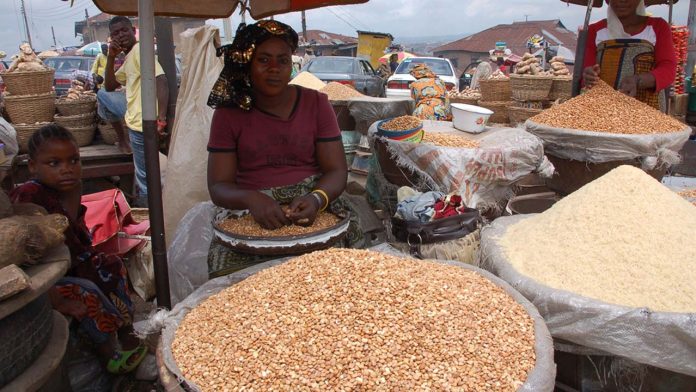By Ishaya Ibrahim
Nigeria may be dangling on the cliff of another recession should the Central Bank of Nigeria (CBN) accede to the presidential order to suspend giving foreign exchange (forex) at official government rate to importers of food items.
An economist, Ayodele Peterson, explained in an interview with TheNiche that the government’s decision was too sudden and would cripple the economy if implemented at once.
While playing host to governors of the All Progressives Congress (APC) who visited him in his home town, Daura, in Katsina State, President Muhammadu Buhari said his administration has achieved food security, and hence, the central bank should not give a cent to food importers.
“Don’t give a cent to anybody to import food into the country. We have achieved food security, and for physical security we are not doing badly,’’ he said.
Nigeria operates a system of multiple exchange rates; the official exchange rate, interbank rate, and Importers and Exporters (I&E) Window. The law provided the CBN certain measure of autonomy from being dictated to by the executive branch of the government in using the monetary instrument to tweak the economy.
The CBN is the official source of foreign exchange to the manufacturing sector. The sector enjoys the privilege of accessing the dollar at N305. Some of the food items which the President wants the CBN to cease giving forex to its importation are raw materials to the production of other products. These include; maize, soybeans, sugar, wheat, and many others.
If the CBN accedes to the order, importers of the items will source their foreign exchange at the importers/exporters window which currently sells a dollar at about N360, thereby triggering inflation.
For instance, Nigeria consumes four million tonnes of wheat annually, but can only produce 100,000 tonnes. The others are imported. If the government succeeds in restricting official foreign exchange to these imports, it will inflate the price of bread, noodles, biscuits and other products made from flour.
The Bread industry is likely going to be more affected as another line item in its production – sugar, faces similar fate. Nigeria is only seven per cent self-sufficient in sugar production. The bulk of the 1.5 million metric tonnes it consumes is imported.
The Guardian quoted a professor of maize breeding and value chain development at the International Institute of Tropical Agriculture (IITA), Ibadan, Dr Sam Ajala, as saying that Nigeria currently produces about 12 million metric tonnes of maize yearly, while it needs four million tonnes to close the deficiency gap.
Peterson explained that the government’s decision was too sudden and would cripple the economy if implemented at once.
“I understand that the government wants to protect the local industry. This is good but the style of the implementation is bad. There has to be timeline. First, you help the local producers to develop the capacity by supporting them with credit facility before you pull out the forex,” he said.
He said recession is on the horizon and warned that a little misstep will trigger it.
“The economy is not doing so well. There is a significant drop in the inflow in foreign investment. We do not need to add inflation to the list of the problem because it could trigger another round of recession,” he said.
The Partner/Head of Tax and Corporate Advisory Services at PwC Nigeria, Taiwo Oyedele, told The Guardian that the CBN is meant to be independent; it should therefore not be told what to do by the president, especially when the decision is not evidence-based.
“Trying to fix all economic problems using monetary policy is like a carpenter trying to fix all broken furniture with a hammer and a nail. It doesn’t always work. Nigeria is not food-sufficient. Available data suggests the contrary. Stopping foreign exchange allocation to importers of foods will have unintended consequences.
“Every country imports food. Our focus should be on producing what we are best able to produce, export some and import the rest. The move will increase smuggling and push sub-standard imported food items under the radar.
“Self-sufficiency in food production cuts across the entire value chain, including logistics, transportation and storage. So, any restriction without first addressing these related problems is putting the cart before the horse,” he said.













